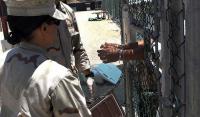-
Calif. gas well blowout caused U.S. largest methane release, study finds
The Aliso Canyon natural gas well blowout released more than 100,000 tons of the powerful greenhouse gas methane before the well was finally plugged 11 February, according to the first study of the event. The results confirm that it was the largest methane leak in U.S. history.
-
-
French Special Forces join fight against ISIS in Libya
French Special Forces are among commando units operating on the ground in Libya against ISIS. A small French force has been operating out of Benghazi’s Benina airport, assisting forces of the internationally backed Libyan authorities in Tobruk. The Pentagon has said that in the absence of a unity government, U.S. Special Forces have been “partnering” with different militias for attacks on ISIS militants.
-
-
Wearing hijab is “passive terrorism”: USAF study
A study issued by the U.S. military has suggested that wearing the hijab by some Muslim women represents a form of “passive terrorism.” The study, originally issued by the USAF in 2011 and re-issued in summer 2015, includes a chapter which contains discussion of radicalization. In addition to the comment about hijabs, the chapter also claims that support for militant groups is driven by “sexual deprivation.”
-
-
Pro-ISIS hackers issue threats to Facebook, Twitter founders
Pro-ISIS hackers have released a video threatening the founders of Facebook and Twitter in retaliation for the two social media giants’ campaign to take down ISIS-related accounts. The threat was issued in a 25-minute video, uploaded on Tuesday to social networks by a group calling itself “Sons Caliphate Army” – which experts say is the latest “rebrand” of ISIS’s supporters online.
-
-
Partition of Syria could be “Plan B” if cease-fire, peace negotiations fail: Kerry
Secretary of State John Kerry said he would support a partition of Syria – what he called “Plan B” – if the U.S.-Russian sponsored ceasefire, scheduled to start in the next few days, fails to materialize. Partition would also be an option, Kerry said, if a genuine shift to a transitional government does not take place in the next few months. Kerry’s words were the first time a senior American official publicly discussed the option of partitioning Syria, although experts have noted that the partition of the country by creating an Assad-controlled Alawite enclave in north-west Syria is Russia’s true goal in the conflict.
-
-
More Americans support Justice Dept. than Apple in locked iPhone dispute
As the standoff between the Department of Justice and Apple Inc. continues over an iPhone used by one of the suspects in the San Bernardino terrorist attacks, 51 percent say Apple should unlock the iPhone to assist the ongoing FBI investigation. Fewer Americans (38 percent) say Apple should not unlock the phone to ensure the security of its other users’ information; 11 percent do not offer an opinion on the question.
-
-
Passwords, privacy and protection: can Apple meet FBI’s demand without creating a ‘backdoor’?
The point of encryption is to make decryption hard. However, hard does not mean impossible. The FBI could decrypt this data, with sufficient effort and computational power, and they could do this with no help from Apple. However, this route would be expensive, and would take some time. In effect, what they’re requesting of Apple is to make their job easier, cheaper and faster. Ultimately, how this matter gets resolved may depend more on the big-picture question of what privacy rights we as a society want for the data we record on our personal devices. Understanding the technical questions can inform this discussion.
-
-
How mobile ads leak personal data
The personal information of millions of smartphone users is at risk due to in-app advertising that can leak potentially sensitive user information between ad networks and mobile app developers, according to a new study.
-
-
Detecting hidden malicious ads hidden in apps
The danger of acquiring a computer virus or spyware used to come with the risk of visiting the dark, sketchy corners of the Internet. But now trusted and harmless smartphone apps like MyFitnessPal and Candy Crush carry their own risks. As more and more people own smartphones, the number of malicious ads hidden in apps is growing — tripling in just the past year.
-
-
U.S. to fly armed drone attacks from a base in Sicily against ISIS in Libya

Italy said it would allow armed U.S. drones to be based in an American base in Sicily so they would be within to launch attacks against ISIS militants in Libya and other northern Africa countries. The agreement was reached after years of negotiations, and against the backdrop of intensified ISIS activity in Libya and other African countries.
-
-
Obama to send last Gitmo relocation plan to Congress today

Moving Guantánamo detainees to the mainland United States has been one of President Barack Obama’s main goals – and a major bone of contention with Congress. The issue has now become more pressing as the United States and Cuba are in the process of normalizing their relationships, and the Cubans want the detainees out of Gitmo as well. Obama will be sending a plan to Congress today (Tuesday), urging lawmakers to agree to move the detainees to locations in the United States – but the plan does not name the sites in the United States to which locations the administration wants to send the remaining detainees.
-
-
Understanding Islamic State: where does it come from and what does it want?

Islamic State (IS) is an instance of a phenomenon that recurs in most religions, and certainly in all monotheistic religions. Every so often militant strains emerge, flourish temporarily, then vanish. They are then replaced by another militant strain whose own beginning is linked to a predecessor by nothing more profound than drawing from the same cultural pool as its predecessor. Whatever the future may hold, IS, like some apocalyptic Christian groups, has proved itself so tactically and strategically adept that it has obviously kicked any “end of days” can well down the road (roughly the same distance al-Qaeda kicked the re-establishment of the caliphate can). Further, much of the IS leadership consists of hard-headed former Iraqi Ba‘th military officers who, if they think about an apocalypse at all, probably treat it much as Hitler’s generals treated the purported musings of Nazi true believers — with a roll of their eyes. Foregrounding IS’s apocalyptic worldview enables us to disparage the group as irrational and even medieval — a dangerous thing to do. If the recent past has demonstrated one thing, it’s that IS thrives when its adversaries underestimate it.
-
-
Snowden ready to return to U.S. for “fair trial”
Edward Snowden has told friends and supporters he was ready to return to the United States if he could be guaranteed a fair trial. Snowden said his representatives had approached the U.S. Justice Department in an effort to negotiate a plea deal, even one involving him spending time in jail. He told the BBC Panorama last year, however, that the Justice Department had made no effort to respond.
-
-
Conflicting claims by Kurds, Turkish govt. over deadly Ankara bombing

The Kurdistan Freedom Hawks (TAK), a Kurdish militant group once linked to the outlawed Kurdistan Workers party (PKK), has claimed responsibility for the bombing in the Turkish capital of Ankara that killed twenty-eight people. The claim was made on the groups’ Web site. On Thursday, the Turkish government said the attack was carried out by the People’s Protection Units (YPG), a Syrian Kurdish militia affiliated with the PKK. YPG has been supported by the United States and has made considerable gains in fighting ISIS in northern Syria.
-
-
New sensor rivals dogs in detecting explosives

Dogs have been used for decades to sniff out explosives, but now a University of Rhode Island scientist and his team have come up with another way to detect bombs: sensors. The scientist has developed a sensor that can detect explosives commonly used by terrorists. One of these explosives is triacetone triperoxide, or TATP. Triacetone triperoxide has been used by terrorists worldwide, from the 2001 “shoe bomber” Richard Reid to the suicide bombers who attacked residents of Paris in November. The explosive is relatively easy to make with chemicals that can be bought at pharmacies and hardware stores, attracting little attention from authorities.
-
More headlines
The long view
Factories First: Winning the Drone War Before It Starts
Wars are won by factories before they are won on the battlefield,Martin C. Feldmann writes, noting that the United States lacks the manufacturing depth for the coming drone age. Rectifying this situation “will take far more than procurement tweaks,” Feldmann writes. “It demands a national-level, wartime-scale industrial mobilization.”
No Nation Is an Island: The Dangers of Modern U.S. Isolationism
The resurgence of isolationist sentiment in American politics is understandable but misguided. While the desire to refocus on domestic renewal is justified, retreating from the world will not bring the security, prosperity, or sovereignty that its proponents promise. On the contrary, it invites instability, diminishes U.S. influence, and erodes the democratic order the U.S. helped forge.
Fragmented by Design: USAID’s Dismantling and the Future of American Foreign Aid
The Trump administration launched an aggressive restructuring of U.S. foreign aid, effectively dismantling the United States Agency for International Development (USAID). The humanitarian and geopolitical fallout of the demise of USAID includes shuttered clinics, destroyed food aid, and China’s growing influence in the global south. This new era of American soft power will determine how, and whether, the U.S. continues to lead in global development.
Water Wars: A Historic Agreement Between Mexico and US Is Ramping Up Border Tension
As climate change drives rising temperatures and changes in rainfall, Mexico and the US are in the middle of a conflict over water, putting an additional strain on their relationship. Partly due to constant droughts, Mexico has struggled to maintain its water deliveries for much of the last 25 years, deliveries to which it is obligated by a 1944 water-sharing agreement between the two countries.
How Disastrous Was the Trump-Putin Meeting?
In Alaska, Trump got played by Putin. Therefore, Steven Pifer writes, the European leaders and Zelensky have to “diplomatically offer suggestions to walk Trump back from a position that he does not appear to understand would be bad for Ukraine, bad for Europe, and bad for American interests. And they have to do so without setting off an explosion that could disrupt U.S.-Ukrainian and U.S.-European relations—all to the delight of Putin and the Kremlin.”
How Male Grievance Fuels Radicalization and Extremist Violence
Social extremism is evolving in reach and form. While traditional racial supremacy ideologies remain, contemporary movements are now often fueled by something more personal and emotionally resonant: male grievance.
